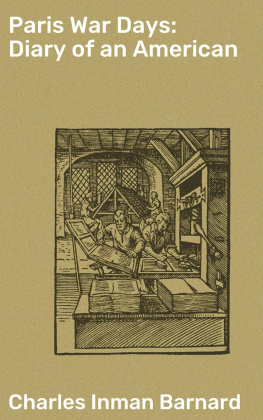PREFACE
Table of Contents
This is not a story of the world-wide war. These notes, jotted down atodd moments in a diary, are published with the idea of recording, day byday, the aspect, temper, mood, and humor of Paris, when the entiremanhood of France responds with profound spontaneous patriotism to thecall of mobilization in defense of national existence. France is herselfagain. Her capital, during this supreme trial, is a new Paris, the likeof which, after the present crisis is over, will probably not be seenagain by any one now living.
As a youth in the spring of 1871, I witnessed Paris, partly in ruins,emerging from the scourges of German invasion and of the Commune. As acorrespondent of the New York Herald, under the personaldirection of my chief, Mr. James Gordon Bennettfor whom I retain adeep-rooted friendship and admiration for his sterling, rugged qualitiesof a true American and a masterly journalistit was my good fortune,during fourteen years, to share the joys and charms of Parisian life. Iwas in Paris during the throes of the Dreyfus affair when, at the callof the late Whitelaw Reid, I began my duties as resident correspondentof the New York Tribune. I saw Paris suffer the winter floods of1910. Whether in storm or in sunshine, I have always found myself amongfriends in this vivacious center of humanity, intelligence, art,science, and sentiment, where our countrymen, and above all ourcountrywomen, realize that they have a second home. With a finger on thepulse, as it were, of Paris, I have sought to register the throbs andfeelings of Parisians and Americans during these war days.
I acknowledge deep indebtedness to the European edition of the New
York Herald, and to the Continental edition of the Daily
Mail, from whose columns useful data and information have been
freely drawn.
C. I. B.
Paris, October, 1914.
PARIS WAR DAYS
Table of Contents
Saturday, August 1, 1914
This war comes like the traditional "Bolt from the Blue!" I had madearrangements to retire from active journalism and relinquish the dutiesof Paris correspondent of the New York Tribune, which I hadfulfilled for sixteen consecutive years. In reply to a request from Mr. Ogden Reid, I had expressed willingness to remain at my post in Parisuntil the early autumn, inasmuch as "a quiet summer was expected."Spring was a busy time for newspaper men. There had been the sensationalassassination of Gaston Calmette, editor of the Figaro, by Mme. Caillaux, wife of the cabinet minister. Then there was the "caving-in"of the streets of Paris, owing to the effect of storms on the thinsurface left by the underground tunnelling for the electric tramways,and for the new metropolitan "tubes." The big prize fight between JackJohnson and Frank Moran for the heavy-weight championship of the worldfollowed. Next came the trial of Mme. Caillaux and her acquittal. Thenfollowed the newspaper campaign of the brothers, MM. Paul and Guy deCassagnac, against German newspaper correspondents in Paris. TheCassagnacs demanded that certain German correspondents should quitFrench territory within twenty-four hours. As several Germancorrespondents were members of the "Association of the Foreign Press,"of which I happen to be president, I was able to smooth matters over alittle. Although my personal sympathies were strongly with theCassagnacs, who are editors of L'Autorit, especially in theircondemnation of the severity of the German Government in regard to"Hansi," the Alsatian caricaturist and author of Mon Village, Imanaged with the help of some of my Russian, Italian, English, andSpanish colleagues to avoid needless duels and quarrels between Frenchand German journalists. Finally, the day of the "Grand Prix de Paris"brought the news of the murder at Sarajevo of the heir to theAustro-Hungarian throne. My friend, Mr. Edward Schuler, was despatchedby the Associated Press to Vienna, and when he returned, I readily saw,from the state of feeling that he described as existing in Vienna, thatwar between Austria and Servia was inevitable, and that unless somesupreme effort should be made for peace by Emperor William, a generalEuropean war must follow.
Wednesday, July 29, the day after Austria's declaration of war againstServia, I lunched at the Hotel Ritz with Mrs. Marshall Field and hernephew, Mr. Spencer Eddy. Mrs. Field was about to leave Paris forAix-les-Bains. We talked about the probability of Russia being forced tomake war with Germany. I warned Mrs. Field of the risk she would run ingoing to Aix-les-Bains, and in the event of mobilization, of beingdeprived of her motor-car and of all means of getting away. At that timeno one seemed to think that war really would break out. Mrs. Fieldfinally gave up her plan of going to Aix-les-Bains and went to London.The following evening Matre Charles Philippe of the Paris Bar and M.Max-Lyon, a French railroad engineer who had built many of the Turkishand Servian railroads, dined with me. They both felt that nothing couldnow avert war between France and Germany.
Yesterday (July 31) a sort of war fever permeated the air. A cabinetminister assured me that at whatever capital there was the slightesthope of engaging in negotiations and compromise, at that very point the"mailed fist" diplomacy of the Kaiser William dealt an unexpected blow.There seems no longer any hope for peace, because it is evident that theMilitary Pretorian Guard, advisers to the German and Austrian emperors,are in the ascendency, and they want war. "Very well, they will haveit!" remarked the veteran French statesman, M. Georges Clemeneau.
After dinner last evening I happened to be near the Caf du Croissantnear the Bourse and in the heart of the newspaper quarter of Paris.Suddenly an excited crowd collected. "Jaurs has been assassinated!"shouted a waiter. The French deputy and anti-war agitator was sittingwith his friends at a table near an open window in the caf. A youngFrenchman named Raoul Villain, son of a clerk of the Civil Court ofRheims, pushed a revolver through the window and shot Jaurs through thehead. He died a few moments later. The murder of the socialist leaderwould in ordinary times have so aroused party hatred that almost civilwar would have broken out in Paris. But to-night, under the tremendouspatriotic pressure of the German emperor's impending onslaught uponFrance, the whole nation is united as one man. As M. Arthur Meyer,editor of the Gaulois, remarked: "France is now herself again!Not since a hundred years has the world seen 'France Debout!'"
At four o'clock this afternoon I was standing on the Place de la Boursewhen the mobilization notices were posted. Paris seemed electrified. Allcabs were immediately taken. I walked to the Place de l'Opra and Rue dela Paix to note the effect of the mobilization call upon the people.Crowds of young men, with French flags, promenaded the streets, shouting"Vive La France!" Bevies of young sewing-girls, midinettes,collected at the open windows and on the balconies of the Rue de laPaix, cheering, waving their handkerchiefs at the youthful patriots, andthrowing down upon them handfuls of flowers and garlands that had deckedthe fronts of the shops. The crowd was not particularly noisy orboisterous. No cries of "On to Berlin!" or "Down with the Germans!" wereheard. The shouts that predominated were simply: "Vive La France!" "Vivel'Arme!" and "Vive l'Angleterre!" One or two British flags were alsoborne along beside the French tricolor.









